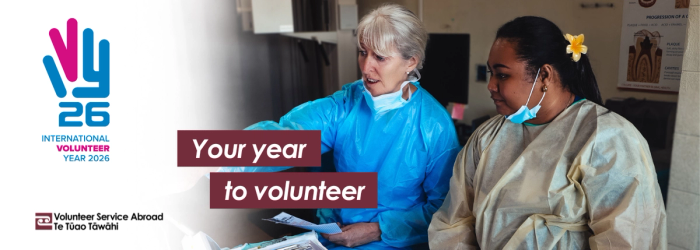Children, teachers benefit from VSA/UNICEF partnership
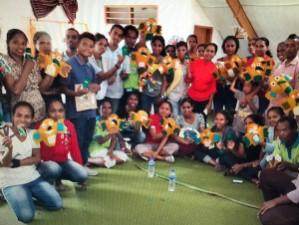

Early childhood teachers in Timor-Leste are soaking up new-found knowledge and passing it on to their young students as a result of a partnership between Volunteer Services Abroad (VSA) and UNICEF.
With support from the Timor-Leste Government, UNICEF has been working alongside the Alola Foundation, a non-profit organisation that supports initiatives that improve the lives of women and children, to implement a community-based pre-school programme in the Ermera and Viqueue regions.
And Volunteer Services Abroad volunteers have been called in to help develop training programmes to upskill the Alola field officers so they can provide quality training to their early childhood educators.
VSA early childhood advisor/mentor Margaret Stevenson and three other VSA volunteers - Jeanette Broomhall, Gigi Yip and Marianne Gardener - are giving that advice, guidance and support to enable the field officers to become knowledgeable, confident leaders of a group of predominantly untrained teachers.
“We are all working towards ensuring these young children have the best chance of becoming healthy, competent and contributing adults as future parents, workers and leaders within their communities, their country and, in fact, impacting positively as citizens of the world,” says Margaret.
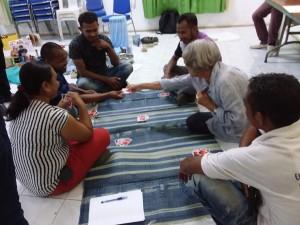

With 2928 children in 103 centres and 185 facilitators in the two regions, the VSA/UNICEF partnership is already having an impact on teachers and children alike, she says.
Take Mana Lucinda, whose key goal was to build warm relationships with children in her class after she saw a more developed pre-school in action.
“It was heartwarming to see her put this into practice and also role model and guide her fellow teachers - gone were the school desks and the rote learning, she took ownership of her newly acquired skills and practices,” says Margaret.


Another community pre-school facilitator took on board different ways to set up classrooms to create learning environments that invite children to engage.
“I am happy because the session and guidance I attended through the collaborative effort of UNICEF and VSA mentors have helped me to learn new pedagogical practices about ways to teach and proactively engage children in learning,” says Silvania Varela.
“I applied the method acquired from these training sessions and it feels good to see kids’ response because they participate proactively in the learning process taking place in the classroom.”
We learnt about effective ways to help children about numeracy and literacy skills
Jacinta Tavares has also benefited from what she describes as a wonderful and positive experience.
“We learnt about effective ways to help teach children about numeracy and literacy skills, for example, how to recognise and write numbers, writing letters and knowing the sound of letters.
“The trainers also helped us to develop our knowledge on how to assist children to become active learners and this has helped our pupils improve their self-confidence and become more brave in expressing their thoughts and ideas.”
UNICEF education officer Aurelio da Costa, who is delivering the training created by VSA volunteers, says their input is invaluable.
“The presence and work contribution from our VSA and UNICEF partnership has been excellent, we learn from each other and work collaboratively to help educators and children who deserve pre-school education acquire quality learning in their community pre-schools.
“It is superb because it also helps me learn from my colleagues from VSA who have more experiences than me in pre-school education - I have treasured the opportunity a lot and look forward to continuing learning and growing through our collaborative partnership.”
Ultimately, the joint approach will impact the wider community.
“It benefits the community and country in the long run - we provide the educators with practical pedagogical skills useful for them which they use to make a positive impact in their community,” he says.
When it comes to partnerships, Margaret says it’s a privilege to collaborate with UNICEF.
“UNICEF’s ethos of helping to shape the future of children worldwide attracts strong advocates for children and I observed UNICEF colleagues inspire and empower communities to overcome obstacles so that their children could have an early childhood education.
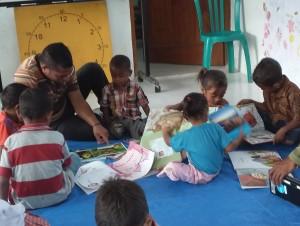

“Like the ripples in a lake caused by a tossed pebble we know that if young children are nurtured and valued, if they have access to good nutrition, can develop and learn in a safe environment they have every chance of growing into healthy contributing adults - humanity’s hope and future.”
Margaret originally began her Timor-Leste assignment in-country in 2019, but when the pandemic struck she returned to her Hawke’s Bay home and continued as an e-volunteer.
While she admits working online has its challenges, it has allowed her to work more closely with field officers, share ideas more easily with her three VSA colleagues, UNICEF and Alola teams.
“Translation issues remain the biggest challenge, both in-country and now as an e-volunteer, as English is Timor-Leste’s fourth language, which means efficient translation is key to a productive working relationship.”
A vital part of Margaret’s role is to bridge that gap.
Ultimately, the joint approach will impact the wider community.
“An important part of my role is to translate curriculum, policies and the input into
Government policy from off-shore academics and consultants into child-centred and wise practice in the Timorese classroom.”
Margaret is well-versed in early childhood education, having been involved in the sector as a Government adviser, lecturer, centre owner and consultant for almost 30 years.
“No question it is my hobby and my work, and, as the saying goes, if you enjoy what you are doing it never seems like an onerous task.”
As for VSA, Margaret was drawn to the organisation because of its commitment to capacity building and skill building of the people in the countries it is invited to work in.
“I had worked in developing countries before and love meeting, engaging with and acquiring new understanding of different cultures.”
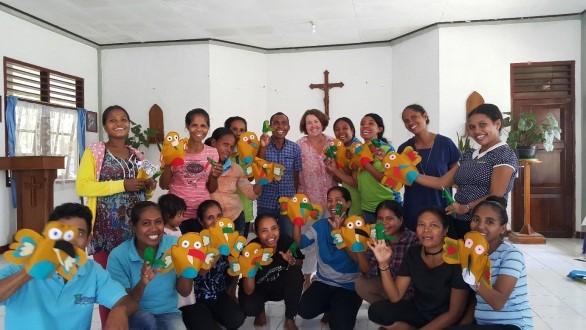

Teachers present their hand puppets
